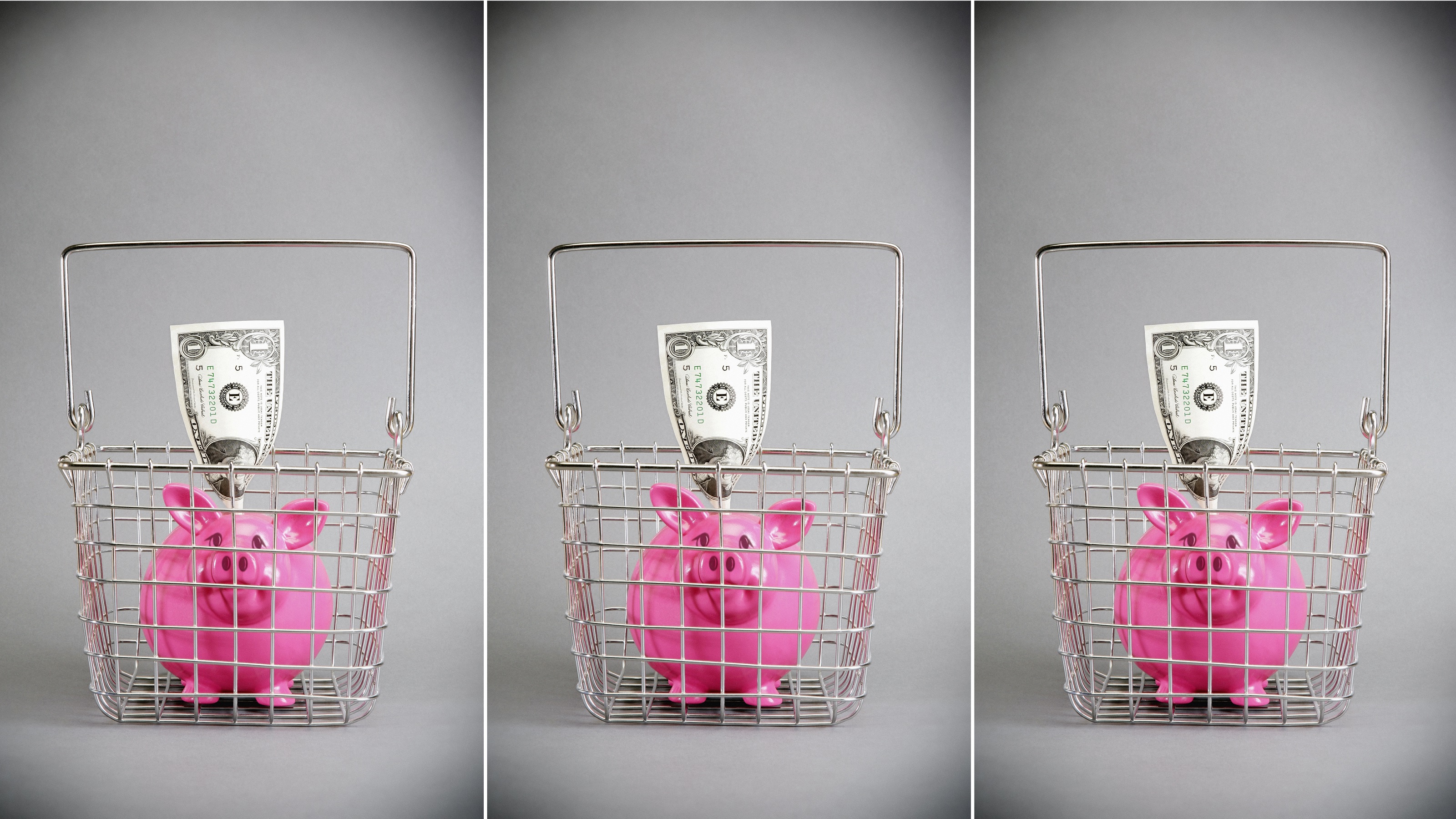In Retirement, Put Your Eggs in These Three Baskets
Dividing your money this way can help ensure you don’t run out during the many years you spend happily retired.


Profit and prosper with the best of Kiplinger's advice on investing, taxes, retirement, personal finance and much more. Delivered daily. Enter your email in the box and click Sign Me Up.
You are now subscribed
Your newsletter sign-up was successful
Want to add more newsletters?

Delivered daily
Kiplinger Today
Profit and prosper with the best of Kiplinger's advice on investing, taxes, retirement, personal finance and much more delivered daily. Smart money moves start here.

Sent five days a week
Kiplinger A Step Ahead
Get practical help to make better financial decisions in your everyday life, from spending to savings on top deals.

Delivered daily
Kiplinger Closing Bell
Get today's biggest financial and investing headlines delivered to your inbox every day the U.S. stock market is open.

Sent twice a week
Kiplinger Adviser Intel
Financial pros across the country share best practices and fresh tactics to preserve and grow your wealth.

Delivered weekly
Kiplinger Tax Tips
Trim your federal and state tax bills with practical tax-planning and tax-cutting strategies.

Sent twice a week
Kiplinger Retirement Tips
Your twice-a-week guide to planning and enjoying a financially secure and richly rewarding retirement

Sent bimonthly.
Kiplinger Adviser Angle
Insights for advisers, wealth managers and other financial professionals.

Sent twice a week
Kiplinger Investing Weekly
Your twice-a-week roundup of promising stocks, funds, companies and industries you should consider, ones you should avoid, and why.

Sent weekly for six weeks
Kiplinger Invest for Retirement
Your step-by-step six-part series on how to invest for retirement, from devising a successful strategy to exactly which investments to choose.
Let’s say that your retirement is now around the corner. You’ve heard theories on what you should do in retirement. You have saved and saved and now … You have to make a change and start spending.
Dick Van Dyke has been quoted as saying, “I found out retirement means playing golf, or I don’t know what it means. But to me, retirement means doing what you have fun doing.”
This is a mindset shift that may be helpful for those who are uncertain about the future. As you focus on retirement, think about retiring to something, not retiring from something.
From just $107.88 $24.99 for Kiplinger Personal Finance
Become a smarter, better informed investor. Subscribe from just $107.88 $24.99, plus get up to 4 Special Issues

Sign up for Kiplinger’s Free Newsletters
Profit and prosper with the best of expert advice on investing, taxes, retirement, personal finance and more - straight to your e-mail.
Profit and prosper with the best of expert advice - straight to your e-mail.
Many people do the right thing by planning for their retirement well ahead of time. But when they think of having to start using their retirement money, nagging questions persist because there are some uncertainties in retirement, such as inflation, tax rates, market volatility and health issues. Am I going to have enough money to retire? Am I going to outlive my assets?
Whenever you start considering those questions, it makes sense to start making a plan. I suggest that you put together three different baskets for your retirement money.
1. Cash basket
This basket is for short-term needs — for the unplanned expenses, which often feel like they hit at the worst times. At a minimum, it’s prudent to have three to six months of living expenses available in case of emergencies, such as car repairs, a broken appliance, leaky roof, etc.
Building a sizable cash basket or emergency fund well before retirement is a must, allowing you to handle these bad breaks without dipping into retirement savings or taking out loans. Maintaining an emergency fund in retirement is just as important.
One vehicle you can use as a cash basket is a savings account. Ideally, this account would be linked to your checking account. The money should be kept safe and liquid so it is readily available, and it should be tapped only for true emergencies.
Get in the habit of replenishing the account if you draw on the funds. You can also utilize a certificate of deposit (CD). You will incur penalties for taking the money out before the CD matures, but the penalty will not take away from the principal amount deposited. You will receive a much better interest rate and usually come out on top even if you do need to take the funds out early.
2. Income basket
With people generally living longer, you’re possibly going to have at least 15 to 20 years of retirement. The income basket is where you want to have guaranteed, stable income when you’re no longer drawing a paycheck. It is important to have clear goals in place when setting up your income basket. I had grandparents who retired and traveled the world. I also had a grandparent who worked part-time to get out of the house. Your plan will look very different if you are going to travel or engage in other activities that are greatly affected by inflation.
If you want to participate in activities where costs are volatile, you are going to need to look at income options that will give you more flexibility. For example, you may want to consider a bond mutual fund portfolio, short-term government bonds and variable annuities.
If you are planning on spending your retirement on things that are more controlled with lower costs, you can utilize income options with less flexibility. For example, you may want to consider long-term government bonds, high-grade bonds and fixed annuities.
It is important to have a runway in the income bucket of six to 10 years, thus allowing time for the growth bucket to recover in the event of an extended bear market.
3. Growth basket
Once you have figured out what you are going to need to live out your retirement, you can focus on getting a higher rate of return on the remaining funds. When you know your income is taken care of, you can afford to take a risk with some assets. For example, you may want to consider investing in individual stocks, equity/stock mutual funds and international investments. The key to success in the stock market is not selling when things start to drop. Knowing your income is secure makes it easier to stay invested and allows for your growth basket to recover.
Retirement means doing what you have fun doing. That’s hard to do if you’re frequently worried about having enough money. For many people, that’s their biggest retirement concern. Like the old saying goes, don’t put all your eggs in one basket. Actively planning and proportioning money in these three baskets can help alleviate those financial concerns.
Dan Dunkin contributed to this article.
The appearances in Kiplinger were obtained through a PR program. The columnist received assistance from a public relations firm in preparing this piece for submission to Kiplinger.com. Kiplinger was not compensated in any way.
Related Content
- Five Things I Wish I’d Known Before I Retired
- Retirees’ Anti-Bucket List: 10 Experiences You Don’t Want
- Do You Have at Least $1 Million in Tax-Deferred Investments?
- The Four Headwinds of Retirement and How to Combat Them
- To Create a Happy Retirement, Start With the Three Ps
Profit and prosper with the best of Kiplinger's advice on investing, taxes, retirement, personal finance and much more. Delivered daily. Enter your email in the box and click Sign Me Up.

Pete Belcastro is a Certified Financial Planner™ who works for Leonard Advisory Group. He has 16 years of experience in investment management and firmly believes in helping people achieve financial peace by knowing they are well-positioned and informed. Belcastro is a proud member of the National Eagle Scout Association and actively contributes as a scout committee member and assistant scoutmaster. He also does volunteer work as a reader with Reading Is Fundamental Pittsburgh.
-
 Quiz: Do You Know How to Avoid the "Medigap Trap?"
Quiz: Do You Know How to Avoid the "Medigap Trap?"Quiz Test your basic knowledge of the "Medigap Trap" in our quick quiz.
-
 5 Top Tax-Efficient Mutual Funds for Smarter Investing
5 Top Tax-Efficient Mutual Funds for Smarter InvestingMutual funds are many things, but "tax-friendly" usually isn't one of them. These are the exceptions.
-
 AI Sparks Existential Crisis for Software Stocks
AI Sparks Existential Crisis for Software StocksThe Kiplinger Letter Fears that SaaS subscription software could be rendered obsolete by artificial intelligence make investors jittery.
-
 Social Security Break-Even Math Is Helpful, But Don't Let It Dictate When You'll File
Social Security Break-Even Math Is Helpful, But Don't Let It Dictate When You'll FileYour Social Security break-even age tells you how long you'd need to live for delaying to pay off, but shouldn't be the sole basis for deciding when to claim.
-
 I'm an Opportunity Zone Pro: This Is How to Deliver Roth-Like Tax-Free Growth (Without Contribution Limits)
I'm an Opportunity Zone Pro: This Is How to Deliver Roth-Like Tax-Free Growth (Without Contribution Limits)Investors who combine Roth IRAs, the gold standard of tax-free savings, with qualified opportunity funds could enjoy decades of tax-free growth.
-
 One of the Most Powerful Wealth-Building Moves a Woman Can Make: A Midcareer Pivot
One of the Most Powerful Wealth-Building Moves a Woman Can Make: A Midcareer PivotIf it feels like you can't sustain what you're doing for the next 20 years, it's time for an honest look at what's draining you and what energizes you.
-
 I'm a Wealth Adviser Obsessed With Mahjong: Here Are 8 Ways It Can Teach Us How to Manage Our Money
I'm a Wealth Adviser Obsessed With Mahjong: Here Are 8 Ways It Can Teach Us How to Manage Our MoneyThis increasingly popular Chinese game can teach us not only how to help manage our money but also how important it is to connect with other people.
-
 Looking for a Financial Book That Won't Put Your Young Adult to Sleep? This One Makes 'Cents'
Looking for a Financial Book That Won't Put Your Young Adult to Sleep? This One Makes 'Cents'"Wealth Your Way" by Cosmo DeStefano offers a highly accessible guide for young adults and their parents on building wealth through simple, consistent habits.
-
 Global Uncertainty Has Investors Running Scared: This Is How Advisers Can Reassure Them
Global Uncertainty Has Investors Running Scared: This Is How Advisers Can Reassure ThemHow can advisers reassure clients nervous about their plans in an increasingly complex and rapidly changing world? This conversational framework provides the key.
-
 I'm a Real Estate Investing Pro: This Is How to Use 1031 Exchanges to Scale Up Your Real Estate Empire
I'm a Real Estate Investing Pro: This Is How to Use 1031 Exchanges to Scale Up Your Real Estate EmpireSmall rental properties can be excellent investments, but you can use 1031 exchanges to transition to commercial real estate for bigger wealth-building.
-
 Should You Jump on the Roth Conversion Bandwagon? A Financial Adviser Weighs In
Should You Jump on the Roth Conversion Bandwagon? A Financial Adviser Weighs InRoth conversions are all the rage, but what works well for one household can cause financial strain for another. This is what you should consider before moving ahead.